About Robert F. Smith
Sections
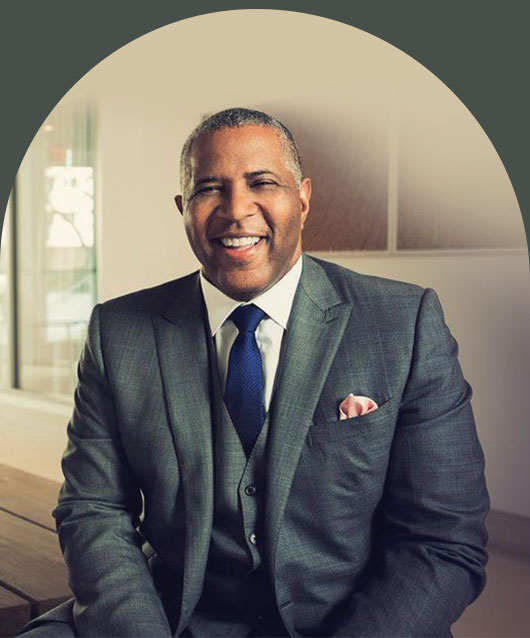
Smith’s Life and Education
Philanthropist and entrepreneur Robert F. Smith was born to Sylvia M. and William R. Smith in Denver, CO, on December 1, 1962. Smith is part of the fourth generation born in Denver on his father’s side. His parents were both educators and supporters of the Civil Rights Movement. The family lived in a Black, middle-class neighborhood with prosperous, motivated wageworkers and their families.
As Smith grew up, his parents helped cement his love of learning. When he had the opportunity to attend a desegregated school, Smith was one of the lucky few children in his neighborhood who was able to attend, even though an arson attack decimated all but a handful of buses meant to transport Black students. Smith said the resources available to him at that school in a white neighborhood engaged and challenged him to expand his worldview.
Smith’s early life was shaped by his environment. His community nurtured school children and provided a safe, loving space where he could thrive. He learned early on how mentors and early STEM and arts education can uplift a young person’s mind. He also first learned about engineering from community elders, participating in a rocket club led by a local volunteer.
In 1985, Smith graduated from Cornell University with a bachelor’s degree in chemical engineering. After a successful early career, Smith pivoted to finance. He attended Columbia Business School at Columbia University, where he earned his MBA in 1994 before joining the investment firm Goldman Sachs. In 2000, he took the leap into entrepreneurship, launching Vista Equity Partners (Vista).
Building Values Through Family and Community
Family expectations of giving, reinforced by peers and community groups, continue to guide Smith’s philanthropy. Smith’s family would provide monthly gifts to the United Negro College Fund (UNCF) no matter their financial situation. He came to understand that his parents donated not as an act of charity but as an investment in the limitless potential of the next generation.
Within his neighborhood, Smith was inspired by what his good friend Rev. Bernice King calls a “Blessed Community.” Neighbors helped neighbors. Children had the benefit of being tutored by older teenagers. The neighborhood’s working professionals served as role models and mentors. Smith came to understand how fortunate he was to have access to these resources and vowed to help educational nonprofits across the country replicate the experience in communities that often lack access to opportunities and resources.
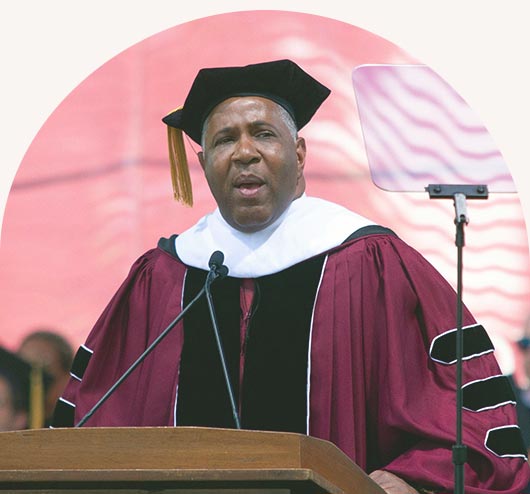
Robert F. Smith announced during his commencement speech at Morehouse College in 2019 that his family would pay off the graduates’ student loan debt.
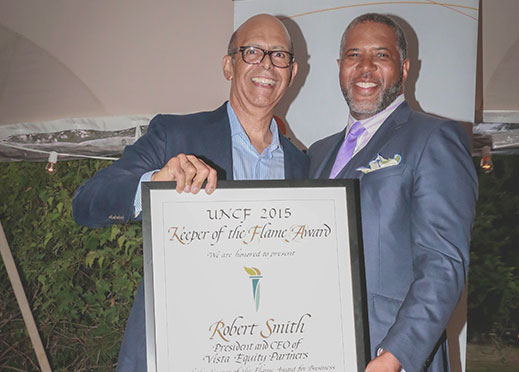
A long time supporter of the United Negro College Fund (UNCF), Smith and his brother helped create the Sylvia M. Young Smith Scholarship Program, honoring their mother.
Smith’s experiences were further reinforced when he joined the historically Black Alpha Phi Alpha (APA) fraternity as an undergraduate at Cornell University. He became part of the legacy of Black American APA brothers, such as Rev. Dr. Martin Luther King Jr. and Andrew Young. APA’s commitment to community outreach mentoring initiatives is a bedrock of the national fraternity.
These experiences inform Smith’s philanthropy, which focuses on education reform, internships, healthcare, the outdoors, historic preservation and racial equity and social justice. These initiatives are designed to uplift individuals and communities, helping them achieve their highest potential.
Smith’s commitment to philanthropy is highlighted in the Giving Pledge. As the first Black American to sign the Giving Pledge, he committed to invest half of his net worth throughout his lifetime back into underrepresented communities across the U.S., while helping to ensure a livable planet for future generations.
“Potential is no guarantee of progress,” Smith wrote in his pledge, “We will only grasp the staggering potential of our time if we create onramps that empower ALL people to participate, regardless of background, country of origin, religious practice, gender, or color of skin.”
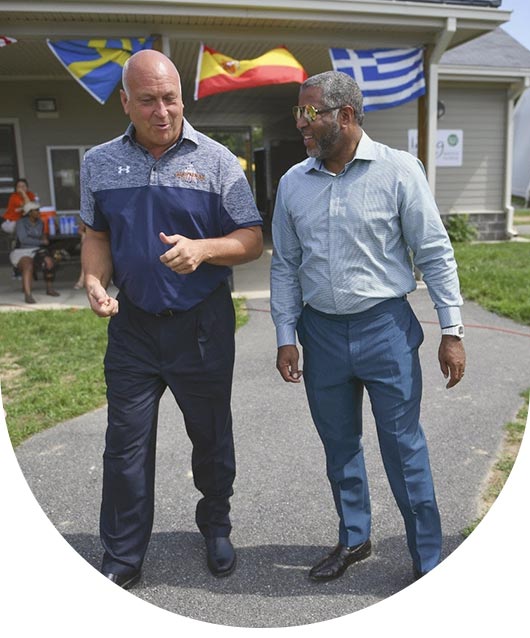
Smith works with local leaders and organizations to help get technology and capital into communities that have historically been neglected.
Breaking Barriers With Educational Opportunity
Smith’s philanthropy focuses on the end goal of liberation — from both institutional barriers and financial burdens. Smith is an advocate for opportunity and access, and he believes that the best way to uplift individuals is to provide the infrastructure and tools for them to achieve success on their own merits. One of the most important ways to accomplish this and create generational change is through education. However, there are roadblocks on this journey for many students from marginalized backgrounds and especially the Black community.
Smith’s focus on education and liberation made him wonder what could be possible if a group of young Black men, ready to graduate college and take on their professional lives, were freed from debt.
Smith decided to eliminate the student loan debt of the 2019 graduating class of Morehouse College and the loans their guardians held on their behalf. He gave each graduate a mission: pay the gift forward.
After his Morehouse College commencement address, Student Freedom Initiative (SFI) was established to help students attending Historically Black Colleges and Universities (HBCUs), other Minority Serving Institutions (MSIs) and Tribal Colleges and Universities (TCUs) have a chance at freedom in professional and personal life choices. Students at Tuskegee University and Virginia State University, as well as other participating HBCUs, MSIs and TCUs, have access to support services and flexible college loan options through SFI. In addition, students have access to valuable internship opportunities and career development events through the internXL program.
Smith has made various commitments to his alma maters over the years. In 2016, Smith and Fund II Foundation, of which he is the founding director and President, provided a combined gift of $50 million to Cornell University. In 2022, Smith contributed $15 million to Cornell University’s College of Engineering, establishing three scholarship funds – the Robert F. Smith Undergraduate Scholarship Fund, the Robert F. Smith Graduate Fellowship Fund and the Robert F. Smith Student Success Fund. In 2017, Smith gave $15 million to Columbia Business School for its Manhattanville Campus. After the opening in 2022, Smith donated $10 million to establish The Robert F. Smith ’94 Scholarship Fund to support students in need.
Smith’s philanthropy has also shaped the corporate identity of Vista, a leading global investment firm. Smith currently serves as the Chairman and CEO of Vista, helping lead its strategy. For example, Vista works with corporate signature partners, such as Girls Who Invest, to provide internships and coding classes to communities that traditionally lack access to opportunities.
Through collaborations with Fund II Foundation, Smith has helped support groups that offer unique educational experiences and opportunities that preserve Black American history and culture, such as:
- The Sphinx Organization
- The King Center
- The Louis Armstrong House Museum
- National Museum of African American History and Culture
- Black History in Two Minutes
Smith’s Board Positions and Philanthropic Accolades
Smith serves as Chairman of SFI and Carnegie Hall and on the Board of Overseers of Columbia Business School. He is also a member of the Board of Trustees of the Louis Armstrong House Museum and the Cornell Engineering College Council.
In addition to his board positions, Smith has received accolades from several institutions and organizations, including the following honors:
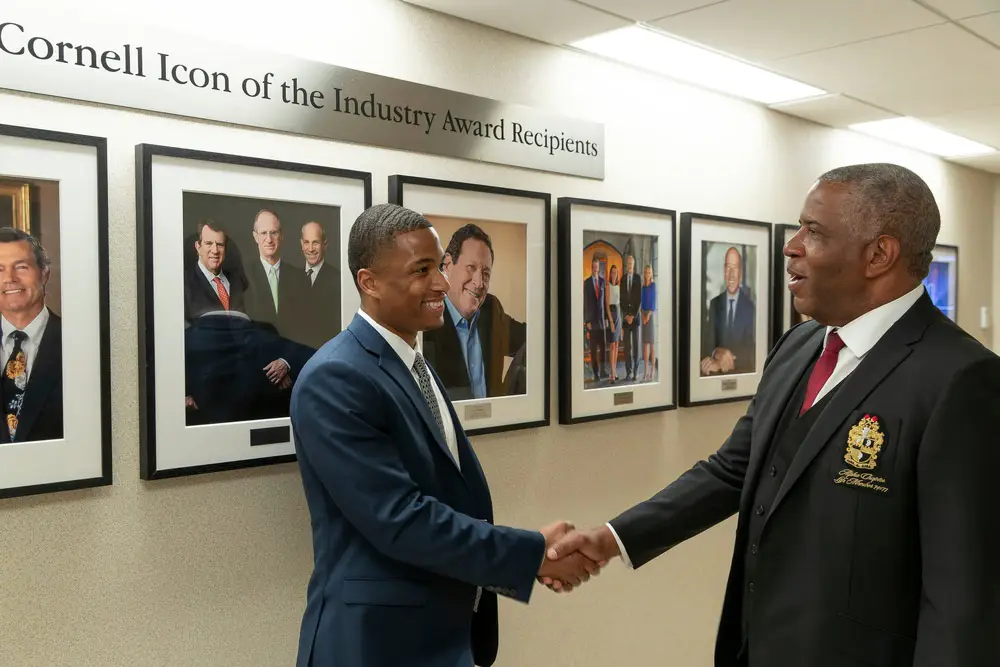
Smith shakes hands with another fellow Cornell University graduate at the Cornell University ceremony honoring Icon of the Industry Award recipients.
- The Ripple of Hope Award from Robert F. Kennedy Human Rights in 2010
- Congressional Black Caucus Foundation Chair’s Award in 2016
- The Jackie Robinson Foundation ROBIE Achievement in Industry Award in 2016
- Forbes’ 100 Greatest Living Business Minds in 2017
- The Carnegie Medal of Philanthropy in 2019
- UNCF’s President’s Award in 2019
- TIME Magazine’s 100 Most Influential People of 2020
- Robert F. Kennedy Justice Prize from The Lawyers’ Committee in 2020
- National Arts Award in 2022
- theGrio’s Philanthropy Icon Award in 2022
- The HBCU Impact Award in 2023
- Visionary Award from Prostate Cancer Foundation in 2023
- Legal Defense Fund’s National Equal Justice Award in 2023
- The Founders Award from Foster Love in 2023
- The George H.W. Bush Points of Light Award in 2023
- Committee for Economic Development’s Distinguished Leadership Award in 2024